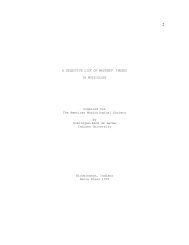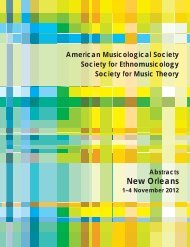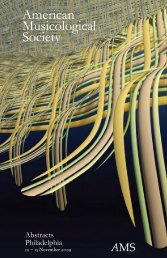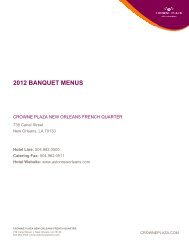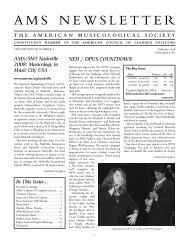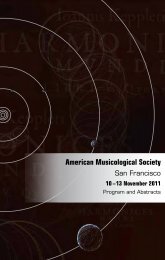AMS Newsletter--February 2010 - American Musicological Society
AMS Newsletter--February 2010 - American Musicological Society
AMS Newsletter--February 2010 - American Musicological Society
Create successful ePaper yourself
Turn your PDF publications into a flip-book with our unique Google optimized e-Paper software.
<strong>AMS</strong> Elections <strong>2010</strong><br />
<strong>AMS</strong> elections take place in the spring each<br />
year. This year, two candidates have agreed<br />
to stand for vice president, one for treasurer,<br />
and six for member-at-large of the Board of<br />
Directors (three are elected).<br />
You may vote electronically at the web site,<br />
or by using the paper ballot sent to members<br />
under separate cover; if you lose it, a replacement<br />
may be obtained at the web site. Please<br />
follow the instructions found on the ballot<br />
carefully. Ballots not conforming to the instructions<br />
are rendered invalid.<br />
Detailed descriptions of the three offices<br />
are found in the <strong>AMS</strong> By-laws, available in<br />
the <strong>AMS</strong> Directory and at the web site.<br />
Candidates for the Office<br />
of Vice President<br />
MICHAEL B. BECKERMAN<br />
Carroll and Milton Petrie Professor of Music,<br />
New York University<br />
Degrees: PhD, Columbia University, 1982;<br />
MA, Columbia University, 1978; BA, Hofstra<br />
University, 1974<br />
Research Areas: Czech and Eastern European<br />
music; film music; music in World War II;<br />
formal analysis<br />
Publications: “Ježek, Zeisl, Améry and the<br />
Exile in the Middle,” Music and Displacement<br />
(Scarecrow, 2009); “The Dark Blue Exile of<br />
Jaroslav Ježek,” Music and Politics 2 (2008);<br />
Martinů’s Mysterious Accident, ed. (Pendragon,<br />
2007); New Worlds of Dvořák (Norton,<br />
2004); “The Songs of Solomon (Rossi) and<br />
the Search for History,” in World of Baroque<br />
Music (Indiana, 2006)<br />
Awards: ASCAP-Deems Taylor Award<br />
(2006); Order of Merit, Czech Parliament<br />
(2004); Honorary Board of Janáček Foundation<br />
(2003); Laureate of Czech Music Council<br />
(2000); Janáček Medal of Ministry of Culture<br />
(1988)<br />
Administrative Experience: Editorial<br />
Board, Complete Dvořák Edition<br />
(2005–<strong>2010</strong>); Director of Research, OREL<br />
Foundation (2006–08); Board of Directors,<br />
Stanford Humanities Center (2000–06);<br />
Program Committee Chair, International<br />
Research & Exchanges Board (1992–2003);<br />
Founder and Director, Center for the Interdisciplinary<br />
Study of Music, UC Santa Barbara<br />
(2000–02)<br />
<strong>AMS</strong> Activities: Board of Directors<br />
(2007–08); Communications Committee<br />
(2006–08); Program Committee (1997);<br />
Council (1993–95, Nominating Committee,<br />
1994); Committee on the Status of Women<br />
(1990–92)<br />
KAROL BERGER<br />
Osgood Hooker Professor in Fine Arts, Department<br />
of Music, Stanford University<br />
Degrees: PhD, Yale University, 1975; Undergraduate<br />
studies at the Institute of Musicology,<br />
Warsaw University, Poland, 1965–68<br />
Research Areas: history of music aesthetics<br />
and theory; Austro-German music 1700 to<br />
1900; vocal polyphony 1400 to 1600<br />
Publications: Bach’s Cycle, Mozart’s Arrow<br />
(California, 2007); A Theory of Art (Oxford,<br />
2000); “Chopin’s Ballade Op. 23 and the Revolution<br />
of the Intellectuals,” Chopin Studies 2<br />
(1994); Musica Ficta (Cambridge, 1987); “The<br />
Hand and the Art of Memory,” MD 35 (1981)<br />
Awards: Marjorie Weston Emerson Award,<br />
Mozart <strong>Society</strong> of America (2008); ACLS<br />
Fellowships (2003–04, 1992–93); Humboldt<br />
Foundation Fellowship (1988–89); Kinkeldey<br />
Award (1988); NEH (1980–81)<br />
Administrative Experience: Appointments<br />
and Promotions Committee, School of Humanities<br />
and Sciences, Stanford University<br />
(2007–08); Planning and Personnel Committee,<br />
Division of Literatures, Cultures, and<br />
Languages, Stanford University (2006–07);<br />
Chair, Academic Council Standing Committee<br />
on Libraries, Stanford University<br />
(2000–01); Chair, Department of Music,<br />
Stanford University (1987–93)<br />
<strong>AMS</strong> Activities: Board Committee on the<br />
Annual Meeting (2008–09); Board of Directors<br />
(2008–09); Editorial Board, J<strong>AMS</strong> (1998);<br />
Chair, Nominating Committee, Board of Directors<br />
(1996); Kinkeldey Award Committee<br />
(1989–91; Chair, 1990); Program Committee<br />
(1987–88); Council (1985–87)<br />
Candidate for the<br />
Office of Treasurer<br />
JAMES LADEWIG<br />
Professor of Music, University of Rhode<br />
Island<br />
Degrees: PhD, UC Berkeley, 1978; MA,<br />
UC Berkeley, 1973; BM, Northwestern, 1971<br />
Research Areas: Frescobaldi; Italian instrumental<br />
and keyboard music of the sixteenth<br />
and seventeenth centuries; early keyboard<br />
notations<br />
Publications: “The Use of Open Score<br />
as a Solo Keyboard Notation in Italy, ca.<br />
1530–1714,” A Compendium of <strong>American</strong><br />
Musicology (Northwestern, 2001); Editor,<br />
nineteen volumes in Italian Instrumental Music<br />
of the Sixteenth and Early Seventeenth Centuries<br />
(Garland, 1987–95); “Bach and the Prima<br />
prattica: The Influence of Frescobaldi on a<br />
Fugue from the WTC,” Journal of Musicology<br />
9 (1991); “The Origins of Frescobaldi’s Variation<br />
Canzonas Reappraised,” in Frescobaldi<br />
Studies (Duke, 1987); “Luzzaschi as Frescobaldi’s<br />
Teacher: A Little-Known Ricercare,” Studi<br />
Musicali 10 (1981)<br />
Awards: ACLS: travel grant, 1986, research<br />
fellowship, 1982<br />
Administrative Experience: Chair, various<br />
search committees, University of Rhode Island<br />
Department of Music, 1990–2009; General<br />
Editor, Italian Instrumental Music of the<br />
Sixteenth and Early Seventeenth Centuries (30<br />
vols., Garland, 1987–95)<br />
<strong>AMS</strong> Activities: Treasurer, 2000–10; Finance<br />
Committee, chair, 2000–10; Editor,<br />
<strong>AMS</strong> <strong>Newsletter</strong>, 1987–90; President, New<br />
England Chapter, 1986–88<br />
Other: has maintained an interest in the<br />
financial world for over twenty-five years; as<br />
an active investor, monitors the markets on<br />
a daily basis<br />
Candidates for the Office<br />
of Members-at-Large,<br />
Board of Directors<br />
NAOMI ANDRé<br />
Associate Professor in Women’s Studies<br />
and the Residential College, University of<br />
Michigan<br />
Degrees: PhD, Harvard University, 1996;<br />
MA, Harvard University, 1993; BA, Barnard<br />
College, Columbia University, 1989<br />
Research Areas: nineteenth-century opera;<br />
gender, race and cultural studies; <strong>American</strong><br />
music<br />
Publications: Voicing Gender: Castrati,<br />
Travesti and the Second Woman in Early<br />
Nineteenth-Century Italian Opera (Indiana,<br />
2006); “Women’s Roles in Meyerbeer’s Operas:<br />
How Italian Heroines are Reflected in<br />
French Grand Opera,” in Opera and <strong>Society</strong><br />
in Italy and France from Monteverdi to Bourdieu<br />
(Cambridge, 2007); “Teaching Opera in<br />
Prison,” in The Intersectional Approach: Transforming<br />
the Academy through Race, Class, &<br />
Gender (North Carolina, 2009); co-editor and<br />
author, Moors, Militants, and Minstrels: Representing<br />
Blackness on the Operatic Stage (Illinois,<br />
forthcoming); “What Does Africa Mean to<br />
12 <strong>AMS</strong> <strong>Newsletter</strong>



